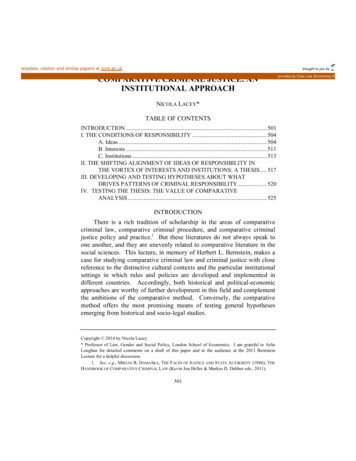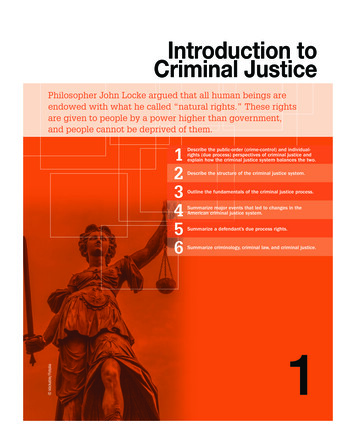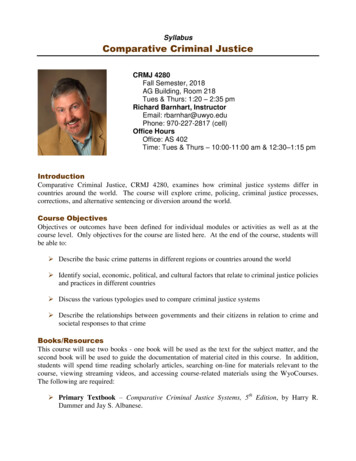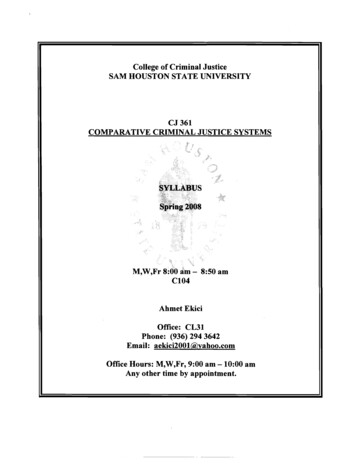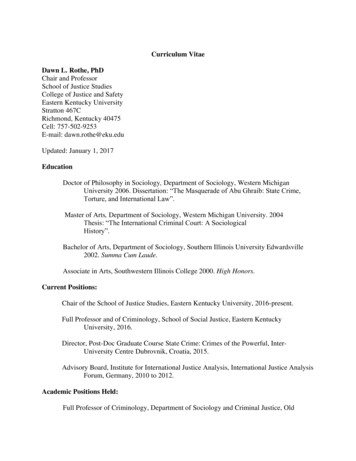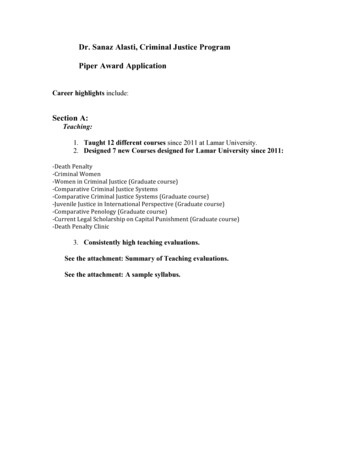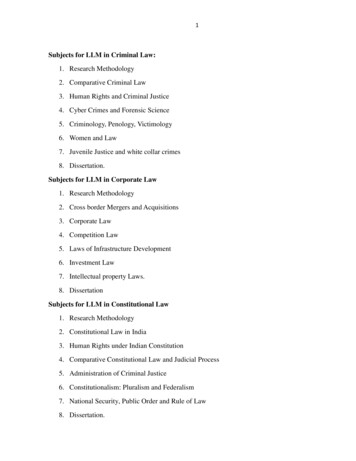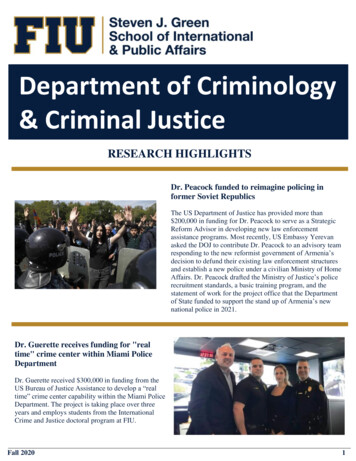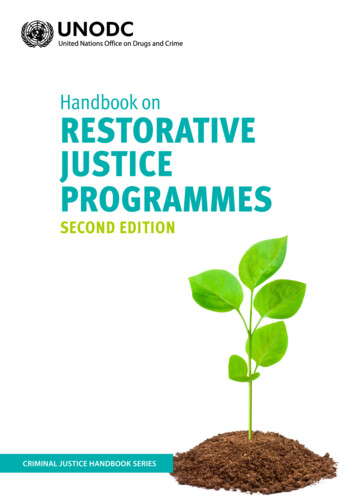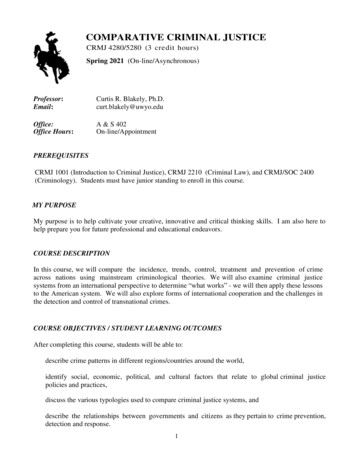
Transcription
COMPARATIVE CRIMINAL JUSTICECRMJ 4280/5280 (3 c re d i t h o u r s)Spring 2021 (On-line/Asynchronous)Professor:Email:Curtis R. Blakely, Ph.D.curt.blakely@uwyo.eduOffice:Office Hours:A & S 402On-line/AppointmentPREREQUISITESCRMJ 1001 (Introduction to Criminal Justice), CRMJ 2210 (Criminal Law), and CRMJ/SOC 2400(Criminology). Students must have junior standing to enroll in this course.MY PURPOSEMy purpose is to help cultivate your creative, innovative and critical thinking skills. I am also here tohelp prepare you for future professional and educational endeavors.COURSE DESCRIPTIONIn this course, we will compare the incidence, trends, control, treatment and prevention of crimeacross nations using mainstream criminological theories. We will also examine criminal justicesystems from an international perspective to determine “what works” - we will then apply these lessonsto the American system. We will also explore forms of international cooperation and the challenges inthe detection and control of transnational crimes.COURSE OBJECTIVES / STUDENT LEARNING OUTCOMESAfter completing this course, students will be able to:describe crime patterns in different regions/countries around the world,identify social, economic, political, and cultural factors that relate to global criminal justicepolicies and practices,discuss the various typologies used to compare criminal justice systems, anddescribe the relationships between governments and citizens as they pertain to crime prevention,detection and response.1
The most effective way to increase our understanding of criminal justice systems is to approach ouranalyses from a critical perspective. It is important, therefore, that you demonstrate a mastery of thismaterial as evidenced in your ability to think in a creative, innovative and critical fashion. It is alsonecessary that you communicate this mastery both verbally and in writing. A mastery of course materialis essential for success in your professional and educational careers.ON-LINE ageonWyoCourses(http://www.uwyo.edu/wyocourses/). This platform houses the syllabus, assignments, discussion posts,exams and your scores (if applicable). Videos, power-points, and additional readings may be madeavailable via the WyoCourses Platform.Students must have access to a computer, MS Office, and internet connectivity that will allow them tocomplete this course. Students should check the course site and their UW email daily. Lack of accessto needed technology is not an excuse for late and/or incomplete work.Each student should behave in a professional manner befitting an intellectual environment. Disrespect,discourtesy and/or otherwise demeaning behaviors are inappropriate and will not be tolerated.FORMAT OF WRITTEN ASSIGNMENTSWritten assignments must meet the following requirements: 12 pt. Times New Roman font, 1-inchmargins, and “Normal” style. Writing assignments must be of the specified length. Papers/citations maybe in APA or MLA format (or another format provided consistency is maintained).REQUIRED READINGSThere is one required book for this course. All additional readings (if any) will be provided by theinstructor. The book may be purchased/rented at the University Book Store or on-line.Comparative Criminal Justice Systems (5th e) by Dammer and Albanese (ISBN-10: 128506786Xor ISBN-13: 978-1285067865).COURSE REQUIREMENTSPreparation for and participation in class is important for student progress. Students are expected toattend, be on time, and be prepared for class (although it is acknowledged that this is an online course).Attendance will be taken randomly via a student sign-in sheet/assignment. We will ascribe to theuniversity policy pertaining to attendance. If a student’s attendance becomes problematic, he/she will benotified. If that does not remedy the situation, notifications will be sent to the Department Chair and/orthe student’s academic advisor. Generally, an absence is not excused unless it is related to a legitimatehealth issue, is military/work related, is due to a school sponsored activity, is family related, or is death2
related (documentation may be requested). In the classroom, if a student “signs in” then leaves beforethe class ends, he/she may be considered absent (unless previous permission is obtained).There will be three tests. Tests may be comprised of matching, short answer, fill-in the blank and essayquestions. A review session (to prepare students for the exam) may be held during the class meetingpreceding each exam (when possible). Tests will be based largely on lecture/class discussion. The firstexam is worth 150 points with each of the two remaining exams being worth 250 pts. The total numberof points possible via tests is 650 points (65% of your grade). Once an exam is graded, it will be returnedfor student review during the next class meeting (when possible). Makeup exams will not be given unlessprevious permission is obtained, or an emergency exists. I reserve the right to make Test 3 (i.e. the finalexam) optional.There may be 2 graded assignments, each worth 50 pts, for a total of 100 points or 10% of your grade. Ifthese tasks are not assigned (due to time constraints), each student will be awarded full credit.There will be a writing project that will account for the remaining 250 points or 25% of your grade. Thiswill consist of a paper that will be 4-6 pages in length (8-10 pages if you are taking this course forgraduate credit). The title page and reference list will not count toward the page-length requirement.The total possible number of points a student can earn in this course is 1000 (650 points via tests, 100points via assignments and 250 points via term paper). Of course, the total points potentially earned byexam may change if the Test 3 option mentioned above is implemented.The grading scale is as follows:A 100 - 90%B 89 - 80%C 79 - 70%D 69 - 60%F 59% and belowTest #1Test #2Test #3Writing Assignment #1Writing Assignment #2PaperTotal150 points250 points250 points50 points50 points250 points1000 pointsThroughout the semester, students may also be given non-graded writing assignments that must becompleted. While these assignments will not count toward your final course grade, they are designed toprepare you for the examinations, may be used for attendance purposes and to help you become a moreproficient writer. They may also count as extra credit at my discretion.3
I reserve the right to raise/lower (at my discretion) a student’s final grade if the student has madesubstantial effort and has demonstrated continuous improvement in this course or has failed to fulfill allrequirements for this course. I also reserve the right to modify course material, the way they are delivered,or other procedures provided students are given adequate notice.If you miss class, it is your responsibility to get notes from a classmate.COURSE GRADE GUIDANCEWith written assignments, it may be helpful to think of your work as being graded along a continuum,ranging from superior to unacceptable. Below are broad comments that provide insight into the gradingof written work in this course. Always remember that your job as a writer/communicator is to make youraudience’s task of understanding your message as effortless as possible!A RangeSuperior Work. Demonstrates exceptional ability to creatively andappropriately organize and express ideas. Provides a comprehensive andthoughtful response to all assigned questions/tasks. Lacks “distractions”that include problems with word use, sentence structure and punctuation.B RangeExcellent Work. Demonstrates a high level of organization andexpression of ideas exceeding that which is found in “C” level work but isnot as comprehensive, thoughtful, or is expressed as fully or that reachesthe same level of quality as do those responses that warrant an “A” grade.C RangeFair Work. Demonstrates moderate skill in organization and expressionof ideas. Provides an acceptable response to all assigned questions/tasksbut is not of the same quality as “B” level work since it lacks acomprehensive presentation, lacks full or precise thought-development, orreflects issues with word use, sentence structure and/or punctuation.D/F RangeMarginal & Unacceptable Work. Demonstrates little to no ability toorganize and express ideas in an understandable manner. Provides anincomplete response to some or all the assigned questions/tasks, may havesubstantial problems with thought-development, word use, sentencestructure and/or punctuation. These responses fall below expectation.MISSED ASSIGNMENTS / EXAMSIt is highly recommended that students take the exam on the announced date. If an emergency arises,please contact me immediately. If prior arrangements cannot be made, notify me as soon as possible.All missed assignments/exams must be submitted/completed within 7 days (of the originalassignments/test date) unless other arrangements have been made with the instructor. Grades on lateassignments may reduced (depending on circumstance) at the discretion of the instructor (not to exceed10% of the assignment’s original value)4
CLASS RULES / ENVIRONMENT (primarily intended for traditional classroom meetings)Each student should remain silent during class unless conversing with the instructor or participating in aclass project/discussion. Talk occurring between students is distracting.Only registered students should attend course meetings unless previous permission is obtained.Please silence all telephones prior to class. Tape recording is not allowed unless permission is given bythe instructor.I am not allowed to release grades by email/phone – so if you want to know your progress, come see me!Any student that causes a willful disruption in class may be removed/disciplined per policy.ACCOMMODATIONSIf you have a physical, sensory, cognitive, or psychological disability and require accommodations,please let me know as soon as possible. I highly recommend that you register with, and providedocumentation of your disability to, Disability Support Services (DSS), 128 Knight Hall. You canreach them at: 307.766.3073 (also TTY).DIVERSITY / NON-DISCRIMINATIONThe University of Wyoming values an educational environment that is diverse, equitable and inclusive.The diversity that students and faculty bring to class, including age, country of origin, culture, disability,economic class, ethnicity, gender identity, immigration status, linguistic, political affiliation, race,religion, sexual orientation, veteran status, worldview, and other diversities are valued, respected, andconsidered a resource for learning.Civil discourse is an essential aspect of the search for and transmission of knowledge. Words and actionsthat promote and encourage self-worth, respect and dignity are consistent with the University’s mission.Conversely, words or actions that reflect prejudice, stereotypes and discrimination are antithetical to themission of the University. Every effort within the context and protection of the First Amendment will beexpended to eliminate such conduct from the campus community. Teaching students to live productivelyin a multicultural/multiethnic society is a process that must take place within a constructive andharmonious environment. It is the obligation of the faculty, staff, students and the administration of theUniversity of Wyoming to provide this environment.INSTRUCTIONAL PERSONNEL DUTY TO REPORT UNDER TITLE IXThe University of Wyoming is committed to maintaining a respectful, safe, and non-threateningenvironment for its faculty, staff, students, contractors, and visitors and will address and resolve allcomplaints of sexual misconduct.Title IX of the Education Amendments Act of 1972 protects individuals from discrimination based onsex in education programs or activities which receive federal financial assistance. Under Title IX, the5
University has a responsibility to take immediate and effective steps to respond to sexual violence and/orsexual harassment. Title IX mandatory reporters are required to report any allegation of sexualmisconduct. Mandatory reporters at the University include every administrative officer, dean, director,department head, supervisor, and all instructional personnel.Questions concerning Title IX should be referred to UW’s Title IX Coordinator, Jim Osborn(307.766.5200 or report-it@uwyo.edu) or the U.S. Department of Education, Office for Civil ndex.html).ACADEMIC HONESTYIntellectual honesty is a cornerstone of all academic work and is a fundamental principle in each student’sintellectual development. Therefore, the faculty and administration view any form of academicdishonesty as a serious matter. Cheating, plagiarism, and collusion in dishonest activities are acts whicherode the University’s educational and research roles and lessen the learning experience for both theperpetrator and for the entire campus community. The University of Wyoming expects students tounderstand and subscribe to the ideal of academic integrity and be willing to bear individualresponsibility for their work. UW Regulation 6-802 defines academic dishonesty as: “An actionattempted or performed that misrepresents one’s involvement in an academic endeavor in any way orassists another student in misrepresenting his or her involvement in an academic endeavor. Examplesof academic misconduct include (but are not limited to) plagiarism, cheating, fraud, violation ofstandards, multiple submissions, interference or obstruction, and/or complicity.” All students shouldread the University’s Code of Conduct (http://www.uwyo.edu/dos/conduct/). Specific informationregarding Academic Honesty is available at the Dean of Students website (http://www.uwyo.edu/dos/)and in “UW Regulation 6-802” (http://www.uwyo.edu/generalcounsel/ files/docs/uw-reg-6-802.pdf).Academic dishonesty may result in a failing grade for an assignment/exam or for the course.TIPS FOR SUCCESSThis course is challenging and will require dedicated effort. To provide insight into successful scholarlybehavior, here are some tips.Reading: Students should actively read all assigned material as instructed.Time Management: Students should prepare/study between six (6) and nine (9) hours each weekto successfully complete this course. Students will also benefit from reviewing course materialdaily rather than waiting until exam time. Students who spend more time with the materialincrease their ability to retain information. When studying, students should draw on the readings,their notes, and discussions.6
Additional Resources: We here at the University want students to succeed - as such, there areresources dedicated toward this end (http://www.uwyo.edu/studentaff/step/). Students areencouraged to seek out those University resources (or others) that best fit their needs. A few ofthese resources include:Counseling Center: uccstaff@uwyo.edu, 766-2187, 766-8989 (after hours), 341 KnightHall, www.uwyo.edu/uccAcademic Affairs: 766-4286, 312 Old Main, www.uwyo.edu/acadaffairsDean of Students: dos@uwyo.edu, 766-3296, 128 Knight Hall, www.uwyo.edu/dosUW Police: uwpd@uwyo.edu, 766-5179, 1426 E Flint St, www.uwyo.edu/uwpd7
COURSE SCHEDULE – TENTATIVE (Subject to Change)Jan. 21 - 31Chapter 1 (First week of classes)IntroductionComplete Attendance Quiz by 1/25 (11:59 pm)Feb. 1 - 7Chapter 2Measuring and Comparing Crime in and across NationsComplete Attendance Quiz by 2/5 (11:59 pm)Feb. 8 - 14Chapter 3Families of LawTest #1 - ReviewFeb. 15 - 21Chapter 4 (No classes on the 15th - University Holiday)Six Model NationsTest #1 Due by 2/19 (11:59 pm)Feb. 22 - 28Chapter 5Law Enforcement: Functions, Organization, and Current IssuesMarch 1 - 7Chapter 6Criminal ProcedureComplete Attendance Quiz by 3/5 (11:59 pm)March 8 - 14Chapter 7The Courts and Legal Professionals8
March 15 - 21Chapter 8After Conviction: The Sentencing ProcessComplete Writing Assignment #1 (Due 3/19 by 11:59 pm)March 22 - 28Chapter 9After Conviction: The Problem of PrisonTest #2 - ReviewMarch 29 - 30Chapter 10TerrorismTest #2 Due by 4/4 (11:59 pm)(exam length/difficulty will be adjustedaccordingly to accommodate our break)March 31 - April 4SPRING BREAK SPRING BREAK SPRING BREAK SPRING BREAKApril 5 - 11Chapter 11Transnational Organized CrimeApril 12 - 18Chapter 11 Cont.Complete Writing Assignment #2 (Due 4/16 by 11:59 pm)April 19 - 25Chapter 12Juvenile Justice an International PerspectiveApril 26 - May 2Chapter 12 Cont.May 3 - 9Term Paper Workshops/Papers Due/Course Wrap-UpTerm Paper Due 5/7 (11:59 pm)May 10 - 14ON-LINE FINAL EXAM - TBA9
COVID – 19 NOTIFICATIONCOVID-19 POLICIESDuring this pandemic, you must abide by all UW policies and public health rules put forward by the City of Laramie,the University of Wyoming and the State of Wyoming.Wear face coverings when you are with others, stay the required physical distance apart from others, take requiredCOVID tests for campus presence and travel, and report your health status in COVID app daily. For the health of ourUW community, you should limit unnecessary personal travel.As with other disruptive behaviors, we have the right to dismiss you from the classroom (Zoom and physical), or otherclass activities if you fail to abide by this policy.HYFLEX, ZOOM, and WYOCOURSES EXPECTATIONSI will do my best to make this course useful to you, and will respond to questions, concerns, and feedback as quicklyas I am able.MY COMMITMENTS Respond to questions within 24 hours, Provide timely and detailed feedback, and Respect you as a learner and an individual.YOUR COMMITMENTS Abide by all COVID related policies and rules to promote the health and well-being of fellow students andyour/my personal self-care, Give and receive feedback from me and your classmates respectfully and constructively in all interactions.This includes in Zoom chats, on WyoCourses boards, and within physical classroom spaces, Actively engage in civil discourse in a respectful manner. Limit your use of person-to-person Zoom chats,and always chat in all forums using professional language, Whenever you send class-related email or messages, please include a clear, specific subject line and use thebody of the email or message to explain the purpose for the email and any attached materials. Conductyourself professionally, You must meet all assignment deadlines and interact with all required course material/s throughout the week,and Ask for help if/when you need it.10
Comparative Criminal Justice Systems (5th e) by Dammer and Albanese (ISBN-10: 128506786X or ISBN-13: 978-1285067865). COURSE REQUIREMENTS Preparation for and participation in class is important for student progress. Students are expected to attend, be on time, and be prepared for class (although it is acknowledged that this is an online course).
